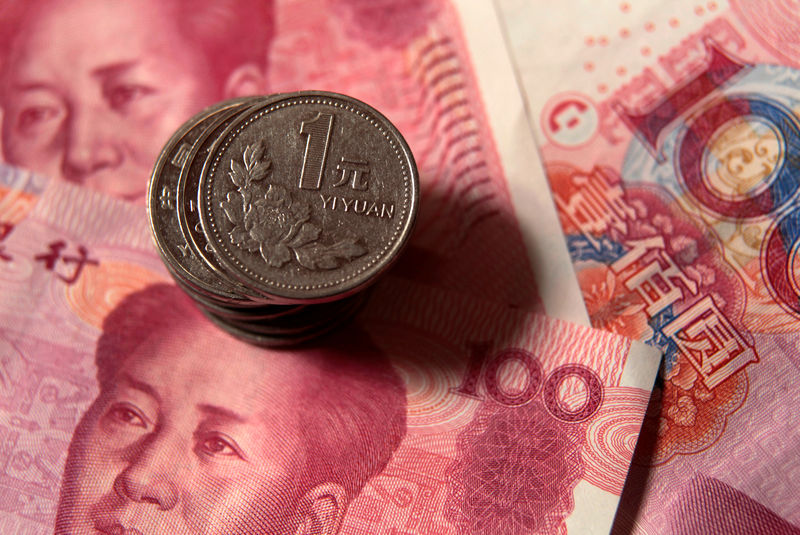(Bloomberg) -- Investors in China’s tumbling sovereign bonds are counting on Beijing to unleash more cash into the financial system.
A flood of issuance, liquidity withdrawals and returning risk appetite globally have combined to accelerate the selloff in Chinese government debt, with the yield on 10-year cash bonds approaching its highest level since February. On Tuesday, futures on the notes fell as much as 0.8%, the most since mid-May.
Analysts expect the central bank will offer some kind of reprieve to the bond market, most likely cutting the amount of funds lenders need to set aside in reserve. That could happen as soon as this month, according to a commentary published Wednesday by a state-run newspaper, which also cited the likelihood of a deposit-rate cut in the third quarter.
The People’s Bank of China pumped trillions of yuan into the financial system earlier this year, driving borrowing costs to multiyear lows. While those policies encouraged lending, they also resulted in rampant arbitrage where corporates borrowed cheaply to buy high-yielding investment products, diverting money away from the real economy. It partly explains why the central bank is not rolling over some funds, stoking one of the worst sovereign bond routs in the world.
Now, the concern is that tighter liquidity in the financial system will lead to higher funding costs and hurt the economic recovery, say Citigroup Inc (NYSE:C). analysts.
“The sale of the special government bonds is pressuring the already fragile market sentiment, which was hurt by a lack of PBOC easing since May,” said Becky Liu, head of China macro strategy at Standard Chartered (OTC:SCBFF) Plc, predicting the 10-year yield will rise to just below 3% in coming weeks. “The central bank will bring forward its plan to cut reserve ratio to this or next month, with the aim of offsetting the liquidity blow.”
The selloff has been fueled by fears that interbank liquidity could quickly dwindle, as China plans to issue 1 trillion yuan ($141 billion) of special government debt by the end of July to combat the impact of the global pandemic. Monday was the first time that China set a timeline for the sale, and said the notes will be auctioned in the public market. Liu said that raised concerns there will be market-wide liquidity tightness.
China’s 10-year debt is the world’s third worst performer since May, following Bulgarian and Pakistani local-currency bonds. The notes have been pressured by tighter liquidity, as local authorities sold the most debt on record in May and banks have sought cash to cope with a massive funding gap this month.
In that time, the central bank has been reluctant to open the spigot: it has put 840 billion yuan into the financial system with short- and medium-term loans to lenders in June, compared with a 2.7 trillion yuan liquidity hole created by maturing policy funds and interbank debt.
Beijing has faced similar pressure recently. China’s government bonds also tumbled in October, sending the 10-year yield to a five-month high, as the PBOC disappointed traders by avoiding aggressive monetary stimulus. The central bank in early November reduced the interest rate on one-year loans to lenders.
It needs to take action soon, as tighter liquidity could start to raise funding costs in the real economy and hurt growth, Citigroup strategists led by Sun Lu wrote in a note. Five-year AA-rated corporate bonds’ yield premium over sovereign notes has jumped by nearly one-third in the past three months, suggesting borrowing costs for cash-hungry smaller companies are climbing.
Offering some comfort to investors, total debt issuance this month and next month may not be as significant as May if one considers both sovereign and local government bonds, according to Sun. The central and regional authorities are expected to sell as much as 1.6 trillion yuan of debt in both June and July, compared with a peak of 1.8 trillion yuan in May, she added. August’s figure is seen easing to 1.4 trillion yuan.
“Liquidity will remain tight in the coming month,” said Xing Zhaopeng, a markets economist at Australia and New Zealand Banking Group Ltd. in Shanghai. “The PBOC will likely loosen its policy at the end of this month when cash supply is the tightest.”
(Adds state-backed media commentary in third paragraph)
©2020 Bloomberg L.P.
